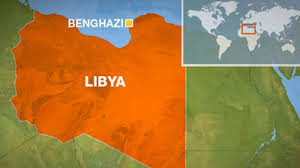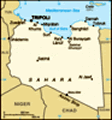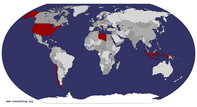Advertisement
Published: January 11th 2015

 Benghazi, Libya
Benghazi, Libya
This shows where the city of Benghazi is in Libya.The airplane finally landed at Benina International Airport in Benghazi Libya at 10:10 a.m. Although a bit exhausted from our
interregional migration (migrating from one geographic realm to another), we stepped out of the plane excitedly and stared in awe at our surroundings. The sun was out and the weather was so beautiful that we wanted to waste no time. Upon reaching the airport, we went to the Libyan ATM and traded in $200 for 264.80 Dinars. We immediately set out in search of food. Our growling stomachs could wait no more. We asked Nani, a retired police woman we had made friends with on the plane, where a good place to eat here was. She enthusiastically told us of one called Al Shabab Restaurant on Fourth Ring Road, assuring us that it would be the best investment. She offered to let us keep our luggage at her house for the day as we traveled, since her house was right along the way of our journey to the restaurant. We graciously accepted her offer and followed her lead. She helped us pack our things into the trunk of her trunk and we piled into the back seat, allowing Jasmine to sit

 Chile to Libya
Chile to Libya
Ngurah Rai International Airport to Benina International Airport in the front. After all, she was the birthday girl. The sights were amazing. We saw many fruit trees and the sun was out. It was about 65 degrees outside, perfect weather for the
Zuwarah Awessu Festival tonight. About 15 minutes in, we arrived at her house. She helped us bring our luggage, along with her own, into the guest room. Then we set out again for the remaining 20 minutes to Al Shabab. Nani insisted that we let her order food for us so we could get a real taste for Libyan cuisine, and of course, we could not resist. She called the waiter over and ordered some dishes in Arabic as we sat, patiently waiting for our food to arrive. We thanked her for being so helpful on our trip so far, for it would have been rather time consuming to find a place to leave our things before heading out. She smiled and told us that she has no problem helping visitors to her homeland. Our dishes arrived within a few minutes, and good thing they did, because our stomach were growling insanely. We had no idea what the dishes were, but they smelled delicious. So we

 Al Shabab Restaurant
Al Shabab Restaurant
Benina International Airport to Al Shabab Restaurant stared at Nani questioningly and waited for her to let us know what it was we were about to consume. She pointed to one dish,
Couscous, and explained that it was made of wheat or barley, ground into coarse flour with vegetable and meat sauce to go with it. The next was called
Mb'atten and was made of sliced potato (about 3mm thick) and had two slices joined together at the base, to form a sandwich, which was stuffed with minced meat and herbs, and then fried. The third was a pastry called
Leka'ek, and was a kind of shortbread, made of flour, sugar, baking powder, and olive oil. We needed no further explanation. Before we began eating, Nani instructed to recite the Arabic word
Bismillah, meaning “In the name of God” as tradition.We enthusiastically dug in and left no scraps. When we finished, we recited the phrase
Al-hamdu lillah, which means “Thank you God” to show respect for the food. It costed 79.44 Dinars, which we thought was a reasonable price for such an amazing cuisine. By the time we left, it was already 1 p.m. So we got Nani’s phone number and address, and agreed to meet her

 El Keish lake
El Keish lake
This is a lake in Benghazi, Libya where the Zuwarah Awessu Festival was held.at her house at 5:30 p.m. to get our luggage and get a ride back to the airport. We were so glad we met her along the way. We wandered aimlessly for a while until we reached a large group of people walking together. Karen, knowing a little Arabic from school, turned to a Libyan teenager near us and asked what was going on. She informed us that they were headed to
El-Keish Lake, where they would be celebrating the
Zuwarah Awessu Festival. Seeing that we were confused, she informed us that it was a festival based on age-old pagan rites including ritual sea bathing for tribes and their animals and included sailing races as well as folk dances and music. Karen and I looked to Jasmine to see if she was interested in participating, but judging by the way she was already following the crowd, we assumed she was. We headed North for about half an hour until we reached the lake. It was more beautiful than we imagined. There were palm trees everywhere and sand surrounding mounds of green hills. The water was clear and shiny, and I could see why they chose this lake to do the ritual in. Nearby, there was a small swimsuit shop and a dressing room for people who would be participating in the bathing part of the ritual. We had brought swimsuits in our luggage, but unfortunately, we left everything except our small satchels back at Nani’s house. So we went into the shop and each bought a different color one piece bathing suit, since revealing clothing and swimwear is frowned upon in Libyan culture. Jasmine chose a purple one, Karen chose a pink one, and I bought myself a black one. Each bathing suit was 39.72 Dinar, which was a bit expensive, but they were necessary so we bought them anyway. An old woman stood in front of the lake facing the crown and silenced us. She introduced herself as Al’ijiah and began to explain to us the significance of this part in the ceremony in the Arabic
language (systematic means of communicating ideas or feelings by the use of conventionalized signs, gestures, marls, or especially articulate vocal sounds). Karen silently translated to us that this ritual traces back to the Pagan days. Every year, the citizens of Libya gather around a body of water and bathe themselves and their animals in it. It is believed to cleanse them of their sins and impurities. The ritual is very sacred to the people of Libya. She then asked us to bow our heads in prayer before going into the water. Although we didn’t know how to pray in Arabic, we repeated after Al’ijiah. The prayer lasted a good five minutes, and then Karen, Jasmine and I held hands and jumped in. It was cool and refreshing, and we all smiled at the thought that this could be used to symbolize purity and forgiveness of our young souls. It was a magical moment for us all as we played with the younger children in the water. They were so young and yet even they were so in touch with their culture, It was very enlightening and made us feel connected to everyone there. Soon we came out of the water and some women began to play traditional music. They played a one-stringed violin called an Anzad,Zokra (a bagpipe), flute (made of bamboo), tambourine, Oud (a fretless lute) and Derbakki, and goblet drum held sideways and played with the fingers along with various other drums. Almost immediately, everyone got up and began line dancing. We pulled Jasmine along with us and joined the line, moving in rhythm with the music being played. After what seemed like forever, the line broke up and everyone went off to eat some of the food being served by the elders. Karen looked at the time and notified us that it was already 4:30 p.m. So we hurriedly ran into the dressing rooms and changed into our clothes before heading out to Nani’s house. Along the walk there, we observed how the women dressed in
hijabs or
mendeels while the men wore ankle length tunics called
shalwar. It was quite the sight. Finally, we reached Nani’s house at about 5:30 p.m. and rang the doorbell. She greeted us and invited us in to pick up our luggage and helped us load it back into her truck again. Then we headed out to the Benina International Airport to catch our 6 p.m. flight to Indonesia. When we arrived at the airport, we thanked Nani for her help and gave her our remaining 39.72 Dinar for gas. She hesitated to take it, but Jasmine insisted it would make us feel better if she did. Finally, she took it and gave us all a hug and said
Hadh Saeed, which means “Good luck” in Arabic. We smiled and grabbed our luggage to head up the steps to our plane location. We climbed up the staircase leading to the airplane and stopped to breathe the Libyan air one final time before beginning our commute (a trip taking several hours and transport modes ranging from cars to trains) to Bali Island. Then we took off.
Advertisement
Tot: 0.114s; Tpl: 0.012s; cc: 13; qc: 54; dbt: 0.0535s; 1; m:domysql w:travelblog (10.17.0.13); sld: 1;
; mem: 1.2mb








